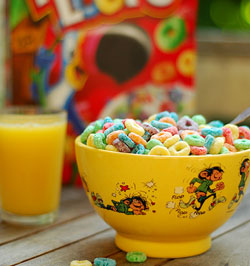
by flickr user Q u e n t i n used under Creative Commons license
Yale’s Rudd Center for Food Policy and Obesity released a groundbreaking study over the weekend showing, definitively, that Corn Pops are still bad for kids. Like, really bad. So bad, only 8 percent kid’s cereals qualify under the federal Women, Infants and Children program (WIC). Recently, big cereal companies like Kellogg’s and General Mills have thrown their weight behind ad campaigns that tout the cereal’s health benefits, most notably added fiber.
Kellogg’s has spent big bucks advertising a measly three grams of fiber (see video below) in two of its best-selling cereals, even though one of those cereals, Froot Loops (41% sugar) tied for sixth WORST cereal for children, beating out only Reese’s Puffs, Corn Pops, Lucky Charms, Cinnamon Toast Crunch and Cap’n Crunch. In 2008, cereal companies spent $165 million advertising to kids, 94% by General Mills and Kellogg’s. With the web, sugary cereals have found even more ingenious ways to snag new noshers, making me nostalgic for the days when you fished 3-D glasses from the bottom of the bag or saved up your box tops for a baseball cap.
Despite the Rudd Center’s findings, all the cereals mentioned in this post meet the industry’s standards as “better for you food.” Among the study’s other findings: “Cereals marketed directly to children have 85% more sugar, 65% less fiber, and 60% more sodium than cereals marketed to adults for adult consumption.” At the same time, many supposedly healthy cereals for adults, like Kellogg’s Smart Start, have just as much sugar as Corn Pops.
Still not convinced? Go back to our March/April Food Package and take a look for yourself.











